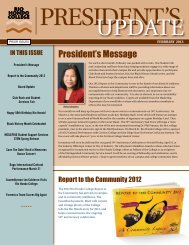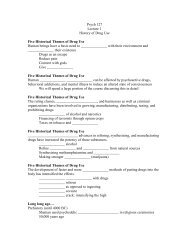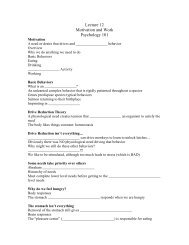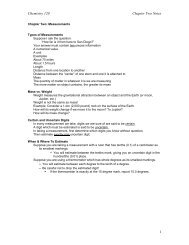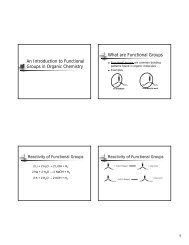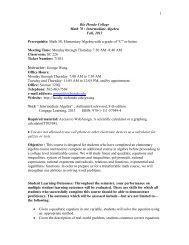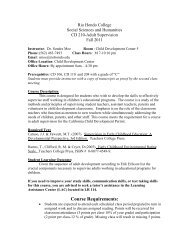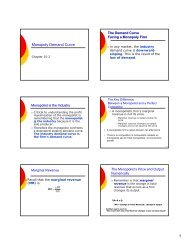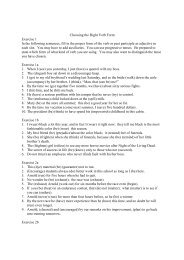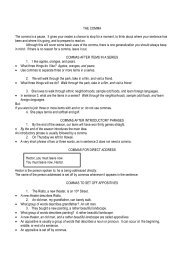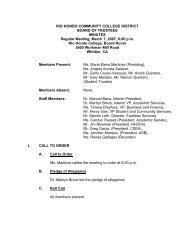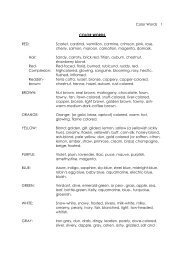Complete College Catalog 2011-2012 - Rio Hondo College
Complete College Catalog 2011-2012 - Rio Hondo College
Complete College Catalog 2011-2012 - Rio Hondo College
You also want an ePaper? Increase the reach of your titles
YUMPU automatically turns print PDFs into web optimized ePapers that Google loves.
____________________<br />
GEOGRAPHY<br />
Division of Mathematics & Sciences<br />
GEOG 101<br />
Introduction to Physical Geography<br />
Advisory: ENGL 035 or ESL 198 or<br />
appropriate assessment; READ 023 or<br />
appropriate assessment; MATH 050 or<br />
appropriate assessment<br />
Transfers to: UC, CSU<br />
Introduction to Physical Geography<br />
is a general education course that<br />
introduces students to the natural<br />
processes that shape the earth.<br />
Weather and climate, landforms<br />
and volcanoes, glaciers, rivers and<br />
coastal phenomena are among the<br />
topics explored. This course is for<br />
any student interested in the physical<br />
processes that shape land masses.<br />
3 Units<br />
54 Lecture hours<br />
GEOG 101L<br />
Introduction to Physical Geography<br />
Laboratory<br />
Prerequisite/Corequisite: GEOG 101<br />
Transfers to: UC, CSU<br />
The physical geography laboratory is<br />
designed to acquaint students with the<br />
methods, techniques and procedures<br />
used by geographers in the study and<br />
analysis of the physical environment.<br />
Students will use maps, the internet<br />
and other tools to work with realworld<br />
geographic data. This course<br />
fulfills the general education lab<br />
requirement in physical sciences when<br />
taken with or after GEOG 101.<br />
1 Unit<br />
54 Lab hours<br />
GEOG 102<br />
Introduction to Cultural Geography<br />
Advisory: ENGL 035 or ESL 198 or<br />
appropriate assessment; READ 023 or<br />
appropriate assessment<br />
Transfers to: UC, CSU<br />
Introduction to Cultural Geography<br />
is a general education course that<br />
introduces students to the basic<br />
elements of culture. Population<br />
growth, migration, ethnicity, language,<br />
religion, folk and popular culture,<br />
and settlement forms are among the<br />
topics presented. This course may be<br />
of interest to students considering the<br />
field of elementary teaching, ecology,<br />
social science, or travel related<br />
vocations.<br />
3 Units<br />
54 Lecture hours<br />
GEOG 103<br />
World Regional Geography<br />
Advisory: ENGL 030 or ESL 197 or<br />
appropriate assessment; READ 023 or<br />
appropriate assessment<br />
Transfers to: UC, CSU<br />
World Regional Geography explores<br />
the world’s geographic regions,<br />
including Subsaharan Africa, North<br />
Africa, Southwest Asia, China,<br />
Southeast Asia, Middle America, South<br />
America, Japan, Europe, and Russia.<br />
This course describes the cultural,<br />
economic and environmental aspects<br />
of each of these geographic realms. It<br />
provides a geographic perspective that<br />
will enhance global awareness and<br />
geographic literacy.<br />
3 Units<br />
54 Lecture hours<br />
GEOG 299<br />
Directed Study: Geography<br />
Transfers to: UC, CSU<br />
The course is intended for students<br />
who have the ability to assume<br />
responsibility for independent work<br />
and to prepare written or oral reports<br />
and/or appropriate projects; who<br />
possess a 2.5 overall grade point<br />
average and/or a 3.0 grade point<br />
average in a major, or for whom the<br />
instructor feels an exception should<br />
be made. Directed Studies may be<br />
developed from any topic arising<br />
from or related to a course of study<br />
that will result in developing depth<br />
and breadth in that subject area.<br />
The project title will vary with each<br />
individual project. Students will be<br />
expected to meet on a regular basis<br />
with their faculty sponsor and submit<br />
a final report or project. One unit of<br />
credit will be awarded for 48 hours<br />
of directed studies, 6 hours of which<br />
must be with an instructor. A student<br />
may take this course for a maximum<br />
of 4 units within a discipline, but may<br />
not accumulate more than a total of 12<br />
units college wide.<br />
1 to 3 Units<br />
48 to 144 Hours<br />
____________________<br />
GEOLOGY<br />
Division of Mathematics & Sciences<br />
GEOL 150<br />
Physical Geology<br />
Advisory: ENGL 035 or ESL 198 or<br />
appropriate assessment; READ 023 or<br />
appropriate assessment; MATH 030 or<br />
appropriate assessment<br />
Transfers to: UC, CSU<br />
Physical Geology, which fulfills the<br />
physical science general education<br />
requirement, is the study of the<br />
materials that our beautiful Earth is<br />
made out of, as well as the processes<br />
and systems operating within the<br />
planet and on its surface. Earthquakes,<br />
volcanoes, oil, beaches, tsunamis,<br />
rocks, rivers, glaciers, plate tectonics,<br />
minerals, continent and mountain<br />
building are among the many diverse<br />
topics that will be explored.<br />
3 Units<br />
54 Lecture hours<br />
GEOL 151<br />
Physical Geology Laboratory<br />
Prerequisite/Corequisite: GEOL 150<br />
Advisory: ENGL 035 or ESL 198 or<br />
appropriate assessment; READ 023 or<br />
appropriate assessment; MATH 030 or<br />
appropriate assessment<br />
Transfers to: UC, CSU<br />
Physical Geology Laboratory engages<br />
students with a “hands-on” review<br />
of the principles presented in GEOL<br />
150 and their application to everyday<br />
life. Laboratory exercises will include<br />
(but are not limited to) earthquake<br />
analysis, the physical properties of<br />
minerals, igneous, metamorphic and<br />
sedimentary rocks, topographic and<br />
geologic map reading, stream, glacial,<br />
desert, coastal and tectonic landform<br />
process analysis and a field study in<br />
the <strong>Rio</strong> <strong>Hondo</strong> Canyon.<br />
1 Unit<br />
54 Lab hours<br />
GEOL 153<br />
Earthquakes<br />
Advisory: ENGL 035 or ESL 198 or<br />
appropriate assessment; READ 023 or<br />
appropriate assessment; MATH 030 or<br />
appropriate assessment<br />
Transfers to: UC, CSU<br />
“Earthquakes” examines the origin,<br />
mechanics, distribution, and effects<br />
of tremors. Spectacular examples of<br />
historical earthquakes are reviewed,<br />
as are such topics as plate tectonics,<br />
earthquake prediction, structural<br />
risk, fault anatomy, paleoseismology,<br />
tsunamis, magnitude scales,<br />
earthquake location, and safety<br />
- as well as a survey of southern<br />
California’s major fault systems and<br />
damaging historical quakes. This<br />
course is designed as an elective credit<br />
for geology majors and interested<br />
students.<br />
3 Units<br />
54 Lecture hours<br />
GEOL 257<br />
Geology of California<br />
Advisory: ENGL 035 or appropriate<br />
assessment; READ 023 or appropriate<br />
assessment; MATH 030 or appropriate<br />
assessment<br />
Transfers to: UC, CSU<br />
Geology of California looks at how<br />
our state was assembled, as well<br />
as its beautiful mountains, deserts,<br />
volcanoes, rivers, and other landforms.<br />
It examines the dynamic micro and<br />
mega processes that created these<br />
features as well as the varied rocks,<br />
minerals, structure and stratigraphy<br />
that underlie them. This course is<br />
designed as an elective credit for<br />
Geology majors and interested<br />
students.<br />
3 Units<br />
54 Lecture hours<br />
GEOL 299<br />
Directed Study: Geology<br />
Transfers to: UC, CSU<br />
The course is intended for students<br />
who have the ability to assume<br />
responsibility for independent work<br />
and to prepare written or oral reports<br />
and/or appropriate projects; who<br />
possess a 2.5 overall grade point<br />
average and/or a 3.0 grade point<br />
average in a major, or for whom the<br />
instructor feels an exception should<br />
be made. Directed Studies may be<br />
developed from any topic arising from<br />
or related to a course of study that will<br />
result in developing depth and breadth<br />
in that subject area. The project title<br />
<strong>2011</strong>-<strong>2012</strong> <strong>Catalog</strong> <strong>Rio</strong> <strong>Hondo</strong> <strong>College</strong> / 193



